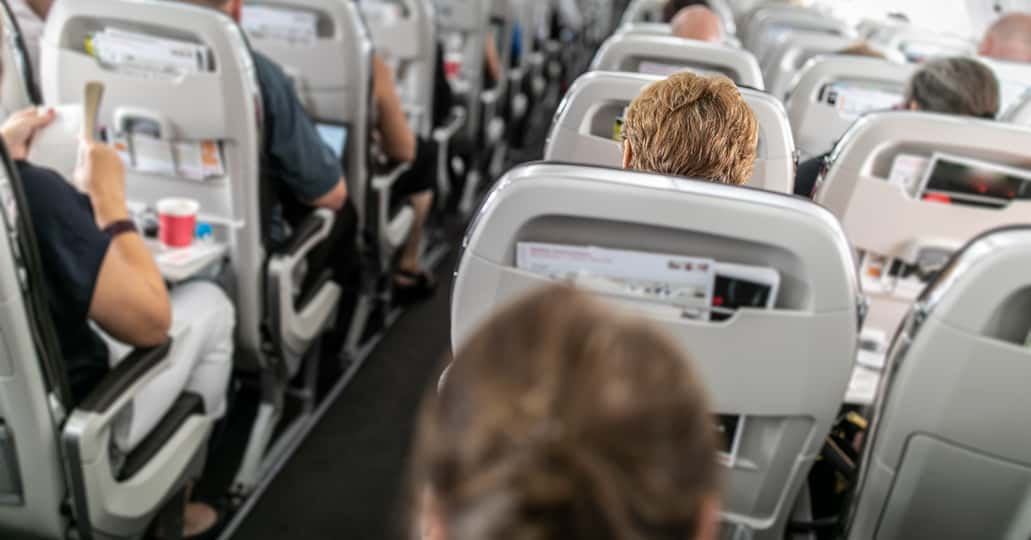Despite macroeconomic challenges, the airline industry is well-positioned for growth due to robust travel demand. Airlines anticipate significant revenue growth in the upcoming quarters, driven by increased leisure travel demand and a revival in business travel.
Considering these factors, it could be wise to add fundamentally strong airline stocks Southwest Airlines Co. (LUV - Get Rating), Delta Air Lines, Inc. (DAL - Get Rating), and Air France-KLM SA (AFLYY - Get Rating) to one’s watchlist.
Before diving deeper into their fundamentals, let’s discuss what’s happening in the airline industry.
The airline industry has rebounded strongly from the stringent pandemic restrictions, driven by pent-up demand for leisure travel. Over the past two years, there has been a surge in demand for hotels, airlines, and cruise lines. According to the WTTC’s 2023 global trends report, the U.S. Travel & Tourism sector’s GDP contribution is expected to reach $2.2 trillion in 2023, supporting 17.4 million jobs.
The strong post-pandemic passenger traffic trend continued in September, with the total traffic in the month increasing 30.1% year-over-year. Globally, traffic is now at 97.3% of pre-COVID levels. International traffic climbed 31.2% compared to the same month in the year-ago period. International revenue passenger kilometers (RPKs) reached 93.1% of the September 2019 value.
The International Air Transport Association’s (IATA) director general, Willie Walsh, said, “The third quarter of 2023 ended on a high note, with record domestic passenger demand for the month of September and continued strong international traffic.”
“With the end of 2023 fast approaching, we can look back on a year of strong recovery in demand as passengers took full advantage of their freedom to travel. There is every reason to believe that this momentum can be maintained in the New Year despite economic and political uncertainties in parts of the world,” he added.
The IATA projects airline industry profits to hit $9.80 billion in 2023, more than doubling the previous forecast of $4.70 billion. Additionally, industry revenues are expected to reach $803 billion this year, marking a 9.7% year-over-year increase. Investors’ interest in airline stocks is evident from the U.S. Global Jets ETF’s (JETS) 14.5% returns over the past month.
Considering these conducive trends, let’s analyze the fundamentals of the three Airlines watchlist candidates, beginning with the third choice.
Stock #3: Southwest Airlines Co. (LUV - Get Rating)
LUV operates as a passenger airline company that provides scheduled air transportation services in the United States and near international markets. The company operates a total fleet of 770 Boeing 737 aircraft and serves 121 destinations in 42 states, the District of Columbia, the Commonwealth of Puerto Rico, and ten near-international countries.
On November 2, 2023, LUV announced an offtake agreement with USA BioEnergy, LLC, for 680 million gallons of sustainable aviation fuel (SAF) over 20 years. This move aims to generate 2.59 billion gallons of net-zero fuel, cutting 30 million metric tons of CO2.
Michael AuBuchon, Managing Director of Fuel Strategy and Management at LUV, highlighted that the agreement with USA BioEnergy is a significant step in developing its sustainable aviation fuel (SAF) portfolio. He looks forward to expanding its strategic relationship with USA BioEnergy and possibly buying more SAF from them in the future, helping it achieve its sustainability initiatives.
In terms of the trailing-12-month Capex/Sales, LUV’s 16.51% is 455.2% higher than the 2.97% industry average. However, its 1.95% trailing-12-month net income margin is 67.8% lower than the industry average of 6.07%. Furthermore, the stock’s 22.93% trailing-12-month gross profit margin is 24.5% lower than the industry average of 30.35%.
For the fiscal third quarter that ended on September 30, 2023, LUV’s total operating revenues increased 4.9% year-over-year to $6.53 billion. Its operating income, excluding special items, was $224 million, representing a decline of 47.3% year-over-year.
However, the company’s net income, excluding special items, and net income per share, excluding special items, stood at $240 million and $0.38, respectively, representing a decline of 24.1% and 24% year-over-year.
Analysts expect LUV’s revenue for the quarter ending December 31, 2024, to increase 8.7% year-over-year to $6.71 billion. On the other hand, its EPS for the quarter ending March 31, 2024, is expected to remain negative. Over the past month, the stock has gained 11.1% to close the last trading session at $24.82.
LUV’s POWR Ratings are consistent with this uncertain outlook. It has an overall rating of C, translating to Neutral in our proprietary rating system. The POWR Ratings assess stocks by 118 different factors, each with its own weighting.
It is ranked #18 out of 29 stocks in the Airlines industry. It has a C grade for Growth, Value, and Quality. Click here to see LUV’s Momentum, Stability, and Sentiment ratings.
Stock #2: Delta Air Lines, Inc. (DAL - Get Rating)
DAL provides scheduled air transportation for passengers and cargo in the United States and internationally. The company operates through two segments: Airline and Refinery.
In terms of the trailing-12-month Return on Common Equity, DAL’s 49.23% is 302.5% higher than the 12.23% industry average. Likewise, its 10.34% trailing-12-month Capex/Sales is 247.8% higher than the industry average of 2.97%. On the other hand, the stock’s 21.26% trailing-12-month gross profit margin is 30% lower than the industry average of 30.35%.
DAL’s operating revenue for the third quarter that ended September 30, 2023, increased 11% year-over-year to $15.49 billion. Its adjusted operating income rose 31.6% year-over-year to $1.96 billion. Additionally, the company’s adjusted net income and EPS increased 35.4% and 34.4% over the prior-year quarter to $1.31 billion and $2.03, respectively.
Street expects DAL’s revenue for the quarter ending December 31, 2023, to increase 3.9% year-over-year to $13.96 billion, while its EPS for the same quarter is expected to decrease 22.9% year-over-year to $1.14. It surpassed the Street EPS estimates in three of the trailing four quarters. Over the past month, the stock has gained 17.6% to close the last trading session at $36.04.
DAL’s bleak prospects are reflected in its POWR Ratings. It has an overall rating of C, which translates to Neutral in our proprietary rating system.
It has a C grade for Growth and Quality. Within the same industry, it is ranked #12. In total, we rate DAL on eight different levels. Beyond what we stated above, we also have given DAL grades for Value, Momentum, Stability, and Sentiment. Get all the DAL ratings here.
Stock #1: Air France-KLM SA (AFLYY - Get Rating)
Headquartered in Paris, France, AFLYY and its subsidiaries provide passenger and cargo transportation services and aeronautical maintenance in Metropolitan France, Benelux, the rest of Europe, and internationally. The company operates through three segments: Airframe maintenance, Engine Maintenance, and Component Support.
On November 10, 2023, AFLYY invested $4.70 million in a strategic cooperation with SAF producer DG Fuels. This supports the development of DG Fuels’ first SAF plant in Louisiana, affirming AFLYY’s commitment to SAF production. The investment grants AFLYY an option to purchase up to 75,000 tons of SAF annually from 2029, aligning with the Group’s aim to achieve 10% SAF incorporation by 2030.
In terms of the trailing-12-month Return on Total Capital, AFLYY’s 8.88% is 28.8% higher than the 6.90% industry average. Likewise, its 0.87x trailing-12-month asset turnover ratio is 9.5% higher than the industry average of 0.79x. On the other hand, the stock’s 6.23% trailing-12-month EBIT margin is 35.6% lower than the industry average of 9.68%.
For the fiscal third quarter that ended on September 30, 2023, AFLYY’s revenues increased 6.8% year-over-year to €8.66 billion ($9.50 billion). Its EBITDA rose 18.8% from the year-ago value to €1.99 billion ($2.18 billion). Also, net income for the period – equity holders rose 103% year-over-year to €931 million ($1.02 billion).
On the other hand, its negative adjusted operating free cash flow stood at €434 million ($475.96 million), compared to an adjusted operating free cash flow of €290 million ($318.04 million).
For the fiscal year ending December 31, 2023, AFLYY’s revenue is expected to increase 16.8% year-over-year to $32.97 billion. On the other hand, its EPS for the same year is expected to decrease 15% year-over-year to $0.37. Over the past month, the stock has gained 6.1% to close the last trading session at $1.30.
AFLYY’s uncertain outlook justifies its overall rating of C, which translates to Neutral in our proprietary rating system.
It has a C grade for Growth, Stability, and Quality. It is ranked #8 in the Airlines industry. To see AFLYY’s Value, Momentum, and Sentiment ratings, click here.
What To Do Next?
Discover 10 widely held stocks that our proprietary model shows have tremendous downside potential. Please make sure none of these “death trap” stocks are lurking in your portfolio:
Want More Great Investing Ideas?
DAL shares were trading at $36.79 per share on Wednesday afternoon, up $0.75 (+2.08%). Year-to-date, DAL has gained 12.51%, versus a 20.60% rise in the benchmark S&P 500 index during the same period.
About the Author: Abhishek Bhuyan

Abhishek embarked on his professional journey as a financial journalist due to his keen interest in discerning the fundamental factors that influence the future performance of financial instruments. More...
More Resources for the Stocks in this Article
| Ticker | POWR Rating | Industry Rank | Rank in Industry |
| DAL | Get Rating | Get Rating | Get Rating |
| LUV | Get Rating | Get Rating | Get Rating |
| AFLYY | Get Rating | Get Rating | Get Rating |






